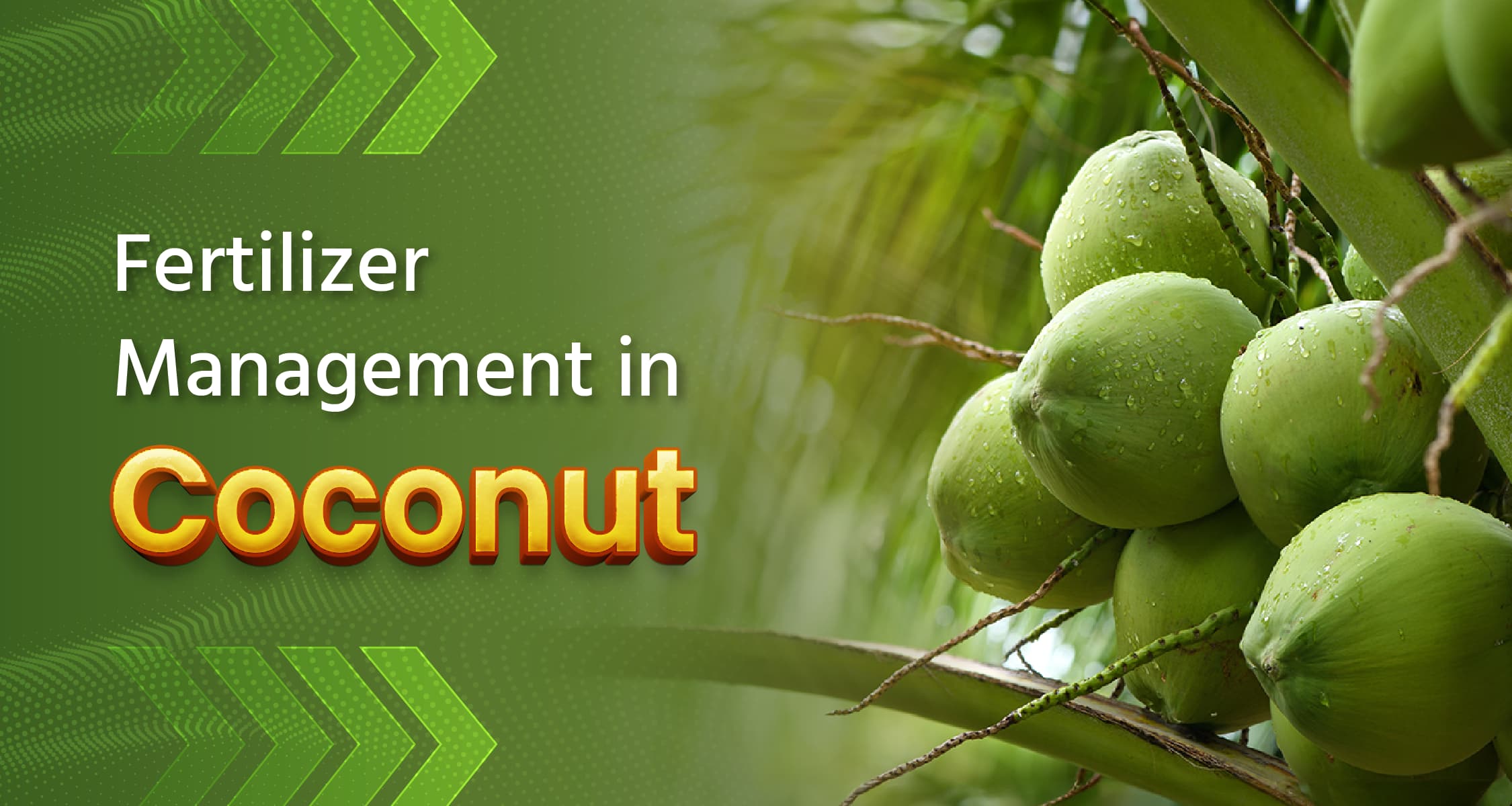Fertilizer Management in Coconut

Coconut is an important fruit used in religious rituals, food, medicine, and cosmetics. It is referred to as the "Kalpavriksha" because it provides a long-term income and these trees can bear fruit for up to 80 years. India is the third-largest producer of coconuts, offering products like oil, water, milk, and copra. For healthy growth and high yield, coconut trees require balanced nutrients, including nitrogen, phosphorus, potassium, magnesium, and calcium. Proper fertilizer management, based on soil testing results, helps improve the crop’s quality and productivity.
Fertilizer Management in Coconut Farming
Before Transplanting
- Before transplanting, use 6.5 tons of organic manure or well-decomposed cow-dung manure per acre. This improves soil fertility and water retention, promoting the early growth of the plants. Organic manure increases the activity of microorganisms in the soil, which helps strengthen the plant roots. Strong roots lead to better yield potential, providing more profit to farmers.
Fertilizer Application in the First Year
- In the first year, when planting is done in May-June, apply 815 grams of urea, 696 grams of diammonium phosphate (DAP), and 2000 grams of muriate of potash (MOP) per plant before the monsoon. These fertilizers are crucial for the initial growth of the plants. After the monsoon, increase the amount to 110 grams of urea, 250 grams of superphosphate, and 225 grams of MOP. This balanced fertilizer management supports early growth and root development in the plants. Proper fertilizer application in the first year ensures faster growth and healthier plants.
Second Year
- Fertilizer management is critical in coconut farming. In the second year, the nutrient requirements of the plants increase. Continue to apply 815 grams of urea, 696 grams of diammonium phosphate (DAP), and 2000 grams of muriate of potash (MOP) per plant. Balanced fertilizer use strengthens the plants and lays the foundation for better production.
Third Year
- In the third year, the plants' nutrient demands increase for growth. At this stage, apply 815 grams of urea, 696 grams of DAP, and 2000 grams of MOP. Additionally, provide 941 grams of 17:17:17 complex fertilizer or 800 grams of 20:20:0 complex fertilizer. These fertilizers help in the growth of the roots, stems, and leaves of the plants.
Fourth Year
- In the fourth year, again apply 815 grams of urea, 696 grams of DAP, and 2000 grams of MOP. This year, also use 1176 grams of 17:17:17 complex fertilizer and 1000 grams of 20:20:0 complex fertilizer. These fertilizers improve both the quality and quantity of the yield.
Fifth Year (Fully Grown Trees)
- In the fifth year, when coconut plants are fully developed, apply 815 grams of urea, 696 grams of DAP, and 2000 grams of MOP annually. Higher fertilizer amounts encourage growth and increased fruit production. Ensure that all fertilizers are evenly spread around the roots to provide complete nourishment to the plants. Proper fertilizer management can maximize the yield potential of coconut trees.
Importance of Other Fertilizers
- Apply magnesium sulfate (MgSO4) at 0.5 kilograms per tree in coastal areas during September-October to prevent leaf yellowing. Add 1.0 kilogram of lime per plant 15 days before applying fertilizer, and mix it into the soil, especially during September-October.
Correct Timing and Method of Fertilization
- The right timing of fertilization is crucial. Apply the correct amounts before (May-June) and after (August-September) monsoon to enhance plant growth and yield potential. Spread the manure and fertilizers evenly around the plant and mix it with the soil to ensure nutrients reach the roots.
Balanced Usage
- Adjust the amount of fertilizers according to the plant's age and soil conditions. If the phosphorus level is above 20 ppm, control the ratio accordingly. Balanced fertilizer management not only promotes plant growth but also improves crop quality.
What types of fertilizers and nutrients do you use in coconut farming? Share your experiences and thoughts with us in the comments. For more such interesting and important information, don’t forget to follow the 'Horticulture' channel. If you liked this post, make sure to like it and share it with your fellow farmers!
Frequently Asked Questions (FAQs)
Q: How long does it take for a coconut tree to start bearing fruit?
A: A coconut tree typically takes around 6 to 10 years to start bearing fruit. This time frame depends on several factors, such as the variety of the tree, soil conditions, climate, and care. Once it begins to produce fruit, a coconut tree can continue bearing coconuts for up to 80 years, making it a long-term agricultural resource.
Q: In which states is coconut farming practiced?
A: The major coconut-producing states in India are Kerala, Tamil Nadu, Karnataka, Andhra Pradesh, and West Bengal. The coastal regions of these states provide the ideal climate for coconut farming, with Kerala being the largest coconut producer.
Q: How many coconuts grow on a coconut tree?
A: A mature coconut tree produces an average of 50 to 80 coconuts each year. This number can vary depending on the age of the tree, its variety, and growing conditions, leading to variations in production.
Q: How often should a coconut tree be watered?
A: For the first two years, a young coconut tree should be watered daily. After that, watering every two to three days is sufficient. The frequency of watering depends on the type of soil, weather, and the growth stage of the tree. It’s important to avoid waterlogging; ensure the soil remains moist, but water should not accumulate.
Q: What nutrients are found in coconut water?
A: Coconut water contains several important nutrients, including sodium, potassium, calcium, magnesium, iron, copper, phosphorus, chlorine, sulfur, vitamin C, and small amounts of vitamin B. These nutrients make coconut water a healthy and refreshing drink.
जारी रखने के लिए कृपया लॉगिन करें

फसल चिकित्सक से मुफ़्त सलाह पाएँ
